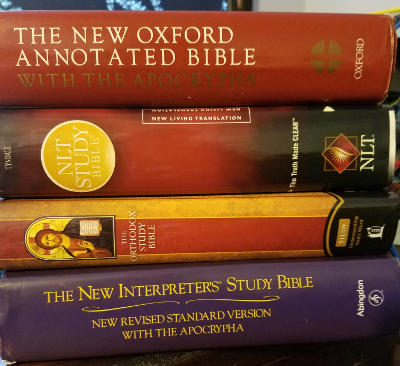From my Blogroll: Better Bibles, Baptists, and Brothers
Better Bibles was one of the earliest entries on my blogroll, and one of the blogs I read before I began blogging myself. I look to the authors for lots of challenging material on Bible translation. They often go much deeper than I would. But these posts are not just about explaining who’s on the blogroll. My plan is to interact with a post.
Wayne Leman posted the Baptist is in. In which he discusses the “clarification” provided by the New Living Translation in John 1:6, in which “just plain John” (John in the text), gets the added identifier of “Baptist.” There’s no doubt that this is a reference to the person we call John the Baptist, so just what precisely is the problem with more clearly identifying him?
On the surface, there doesn’t seem to be a problem. The identification is true, and the identification is true. This isn’t an issue of a difference between the ambiguity in Greek and in English. Whether it’s Greek or English, the same clarity is achieve with name, or the combination of name and title.
Doug at Metacatholic brought up some excellent issues in his post The NLT and the intrusive baptist. The author of John apparently did not see the need for clarity here, and in fact may have had some reasons for expressing things precisely as he did. Now I’d normally comment about now that rhetorical devices that are not noticed by the audience are irrelevant. In other words, if a test audience got no different meaning from a translation that included “baptist” and one that did not, what difference does it make? In this case, however, I think that because there is, in fact, no essential difference between the Greek and English usage, in other words, the inclusion of the title or not has the same impact in both languages, we have a clear choice. In this case we would not be expressing the same thought as was in the Greek using different English wording. Rather, we would justly be accused of modifying the intention of the Greek author.
Let me contrast this to another controversial translation issue where I would make the opposite choice. I happened to encounter this today in 2 Corinthians 13:11, in which Paul’s address of “adelphoi” is translated “brothers and sisters” with the unfortunate footnote, “13:11 Greek Brothers.” Actually “adelphoi” was the proper form of address to an audience of mixed genders in the Greek of Paul’s day. In the dialect of English most dominant where I work, “brothers” would refer to men. The Greek doesn’t say “brothers” it says “adelphoi” and the best English expression available to convey that meaning today is “brothers and sisters.”
I think there would be little controversy if we just happened to have three words, brothers, sisters, and _____, a word used to address an audience of both men and women. I think few would doubt, in that case, that we should use _____ as a translation in this case.


Hi Henry,
I was organizing my books today and a page fell out of my 1879 LSJ Greek Lexicon. It is one of the first pages on which I saw written adelphos – brother, adelphoi – bothers and sisters. So, in fact, “brothers and sisters” is lexically the only correct translation for this word. Funny thing, no one looked that up before drafting the infamous gender guidelines.
Actually that’s Suzanne! 🙂
Thanks for the post, Henry. But (1) isn’t there John’s rhetorical effect in not clearly initially identifying who John the Dipper is? Doesn’t that make the reader struggle with and sympathize with the mystery unfolding about John and mainly (as Doug Chaplin notes) about Jesus? The readers find themselves in the position of the Pharisees questioning John’s identity and hierarchical role among prophets (which has severe implications as to who Jesus is, in relation to both the Pharisees and the reader). If the translator (or John the gospel writer) gives away the punch line to early, then . . .
And (2) what do you think “All men are created equal” means in the American Declaration of Independence? Do you think Elizabeth Cady Stanton and her feminist colleagues really needed their Declaration of Sentiments (to say “All men and women are created equal”? I’m asking, by analogy, to your comments on adelphoi,” which I think no one disagrees can imply broadly “siblings” or metaphorically “family” in the vocative. But what do you think of Michael D. Marlowe’s “The Translation of ??????? and ???????“? Could there be inadequately gendered Greek language in the scriptures (if there is in the Declaration of Independence)?
With regard to (1), I think there is a rhetorical point to the way it is written and I prefer not to see “Baptist” added to clarify that which should not be clear. Nonetheless, I believe the test of a rhetorical device or its translation is how the intended audience understands the passage. Would the audience of the NLT hear that passage differently with “Baptist” included? If they do not, then one’s translation of the rhetorical device fails. I don’t see the device as fully inherent in the text, absent an audience.
WRT (2), I think that we can only transfer a limited amount of meaning in translation. There is, perhaps, a sense in which the writer is thinking more of the men. But I find it ironic that someone who regards “brothers and sisters” as “politically correct” (a phrase I deplore, denigrate even! — see here if you don’t get that), while at the same time expecting the translator to get into the mind of the writer so much as to decide the extent he is thinking about the female and male portions of his audience.
As for the declaration of independence, as part of our national myth, so to speak, I welcome any effort to make it seem more inclusive. But the declaration itself actually meant no such thing, so far as I can tell. It didn’t refer to men as opposed to women, but men living in America as opposed to men living in the homeland, England. Gender was not the only thing left out. There was certainly no equality planned for African-Americans (to use an anachronistic title) or for Native Americans. Thus the declaration fails to address a broad range of inequalities, and we can only hope we are ready to say much more than that.
As for Paul, however, I can’t see how he intended substantially less of his letters to the Corinthian churches for the women than for the men. He doesn’t seem to make that distinction.
I think there would be little controversy if we just happened to have three words, brothers, sisters, and _____, a word used to address an audience of both men and women. I think few would doubt, in that case, that we should use _____ as a translation in this case.
Anyone want to start a movement? Let’s use “siblings” whenever possible. We can use “sibling” if the gender of the sibling is irrelevant in that context. And we could say “male sibling” or “female sibling” if it is.
Greek adelphoi did not mean ‘brothers’ when it referred to a group of males and female. It meant ‘siblings’ (or if we want to “dumb down” (ha!) the language, we could use the more common words “brothers and sisters”).
Actually, I have seriously wondered if, similarly, adelphoi meant ‘sibling’, as well. The context, assisted by the *grammatically masculine suffix, can tell us that it *refers* to a male sibling
Siblings of the world, unite!
🙂
Well, provided that “siblings” was used in that context, I doubt anyone would have a problem using it as a translation. It’s just that pesky “sisters” problem!
if you dont get that), while at the same time expecting the translator to get into the mind of the writer so much as to decide the extent he is thinking about the female and male portions of his audience.
As for Paul, however, I cant see how he intended substantially less of his letters to the Corinthian churches for the women than for the men. He doesnt seem to make that distinction.
🙂 I get what you have given. And, I think I get your point about getting into the mind of the writer. What translator, really, could assume to do that? I really like Richard B. Hays says in his commentary on Paul’s first letter to the Corinthians: “. . . we are literally reading somebody else’s mail.” But Hays also notes that Christians likewise today have to read it as to them, as to the church grown out of Corinth. Much obliged to you for the post, the humor, the comments back, and the dialog!